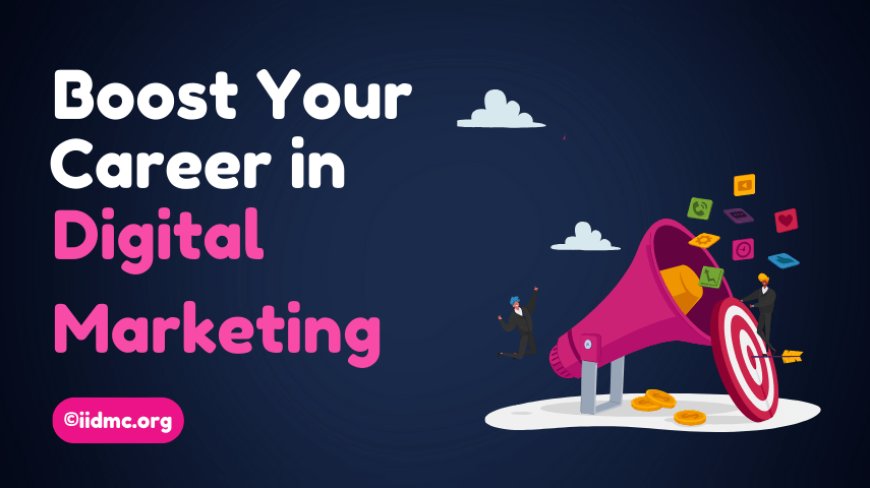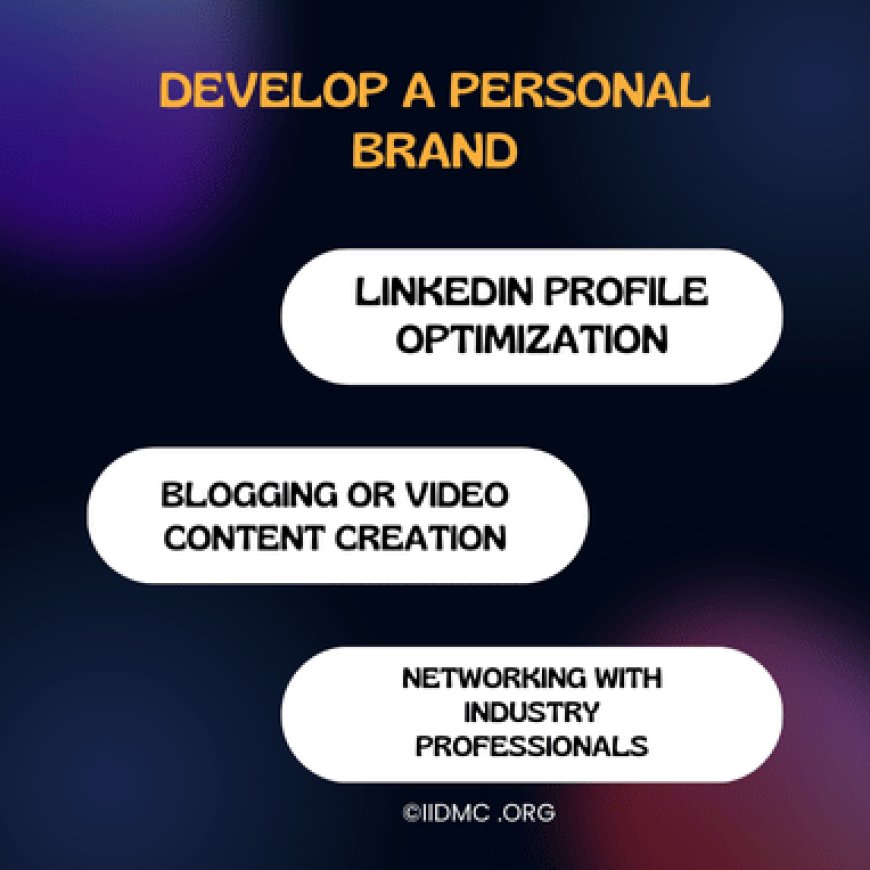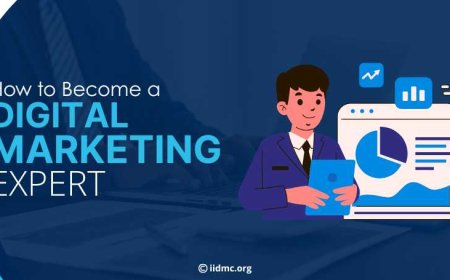Boost Your Career in Digital Marketing
Boost your career in digital marketing with essential skills, expert insights, and strategies. Discover pathways in SEO, content marketing, social media, PPC, and data analytics to stay ahead in the digital landscape.

In today’s digital world, the need for skilled digital marketers is growing rapidly. Businesses of all sizes are using digital marketing to connect with audiences, boost brand awareness, and drive revenue. But with this growth comes fierce competition, making it essential to stand out and continuously evolve. Whether you're new to digital marketing or looking to level up your skills, understanding the latest strategies, tools, and trends is the key to success. In this post, we’ll dive into actionable tips and industry insights that will help you amplify your career, stay ahead of the curve, and secure your spot in the ever-evolving world of digital marketing.
Understanding the Digital Marketing Landscape
Digital marketing is a multifaceted field, with core areas that each play a unique role in reaching and engaging audiences. Key areas include:
-
SEO (Search Engine Optimization): Optimizes content for search engines to increase visibility and organic traffic.
-
Content Marketing: Focuses on creating valuable content to attract, engage, and retain audiences, building brand awareness and authority.
-
Social Media Marketing: Uses platforms like Instagram, Facebook, and LinkedIn to connect with audiences, foster engagement, and grow brand presence.
-
PPC (Pay-Per-Click): Involves paid ads on platforms like Google Ads to drive targeted traffic quickly through search and display networks.
-
Email Marketing: Targets audiences directly with personalized messages, promotions, and updates, enhancing retention and driving conversions.
-
Analytics: Tracks and measures performance across channels, providing insights for optimization and strategic decision-making.
The Importance of a Holistic Understanding
Even when specializing in a single area, a well-rounded understanding of all aspects of digital marketing is crucial. For instance, SEO and content marketing are closely intertwined, while social media and PPC often complement each other in campaign strategies. Knowing how each channel supports the other creates a more cohesive, effective approach to digital marketing.
The Need for Continuous Learning
Digital marketing is constantly evolving, with algorithm changes, new tools, and emerging platforms reshaping the landscape regularly. Successful marketers stay adaptable, continuously learning to keep up with these shifts and adjust their strategies accordingly.
Build a Strong Foundation with Essential Digital Marketing Skills
To succeed in digital marketing, professionals need a solid foundation in key skills. Here’s a breakdown of the most essential ones:
-
SEO (Search Engine Optimization)
SEO is crucial for driving organic traffic by improving a website’s visibility on search engines. By optimizing on-page content, building quality backlinks, and understanding keyword trends, SEO helps attract users actively searching for relevant products or services, ultimately increasing brand reach and conversions without paid ads. -
Content Marketing
Content marketing centers around storytelling and delivering valuable, engaging content to an audience. By sharing useful insights, solutions, and compelling stories, brands can foster stronger connections with their audience, enhancing trust and engagement. Effective content marketing not only educates but also positions the brand as a go-to resource. -
Social Media Marketing
Social media marketing is about more than just posting—it’s about creating strategies that foster community and encourage interaction. Building authentic connections through engaging posts, live sessions, and interactive content boosts brand loyalty and creates an active, engaged following. -
Paid Advertising (PPC)
Mastery in paid advertising platforms, such as Google Ads and Facebook Ads, is essential for targeting specific demographics effectively. With PPC, brands can reach audiences based on interest, behavior, and location, ensuring the message reaches those most likely to convert, which makes it a valuable tool in any digital marketer’s toolkit. -
Data Analytics
Data analytics empowers digital marketers to make informed, data-backed decisions. By analyzing key performance metrics, marketers can identify what works and adjust strategies for better results. Analytics drive efficiency, helping to optimize campaigns, understand audience behavior, and continually improve marketing strategie
Pursue Certifications and Relevant Courses
Certifications can significantly enhance a digital marketing resume, showcasing specialized skills and commitment to continuous learning. Here are some of the most popular certifications that add value:
-
Google Analytics Certification
This certification verifies expertise in Google Analytics, enabling professionals to interpret website data and optimize marketing strategies based on insights. -
Google Ads Certification
Google’s certification program for ads covers search, display, video, and app campaigns, providing hands-on knowledge of campaign setup, targeting, and optimization techniques. -
HubSpot Content Marketing Certification
This program focuses on content marketing fundamentals, including creating engaging content, storytelling, and developing a content strategy that drives engagement. -
Facebook Blueprint Certification
Facebook Blueprint offers certifications for marketers looking to leverage Facebook and Instagram ads effectively. It covers campaign planning, creative strategies, and targeting.
Benefits of Formal Training
Pursuing certifications and courses not only keeps skills current in a fast-changing field but also validates expertise, giving professionals a competitive edge. These programs ensure that digital marketers stay aligned with industry standards and can apply the latest techniques effectively, enhancing their impact in any role.
Develop a Personal Brand and Build Your Online Presence
Building a personal brand is essential for digital marketers looking to establish credibility and attract opportunities. Here’s how to create a strong online presence:

-
LinkedIn Profile Optimization
Start by crafting a professional LinkedIn profile that highlights your expertise. Use keywords relevant to digital marketing, such as "SEO," "content marketing," or "PPC," in your headline, summary, and job descriptions. Showcase relevant experience and add featured projects or certifications to enhance credibility. Make sure your profile photo and banner are polished and professional, aligning with your brand. -
Blogging or Video Content Creation
Sharing insights and expertise through content builds your authority in the field. Consider starting a blog on Medium, your own website, or a YouTube channel. Regularly publish valuable content, such as digital marketing tips, industry trends, or case studies, to engage your audience and demonstrate knowledge. A consistent content presence also improves discoverability and helps you connect with a larger audience. -
Networking with Industry Professionals
Networking is a powerful way to build connections, gain insights, and open doors to new opportunities. Start by following thought leaders in digital marketing on LinkedIn or Twitter, joining relevant digital marketing groups, and participating in industry discussions. Attend webinars, conferences, and local events to expand your network and learn about emerging trends firsthand.
A well-optimized LinkedIn profile, a platform to share your expertise, and a strong network of industry professionals can significantly boost your personal brand and establish your online presence.
Gain Hands-On Experience and Work on Real Projects
Practical experience is invaluable for digital marketers, helping to turn theoretical knowledge into actionable skills. Here’s how to gain hands-on experience and showcase it effectively:
-
Internships, Freelance Projects, and Pro Bono Work
Internships provide structured learning within a professional environment, while freelance projects and pro bono work allow you to work independently and explore diverse client needs. Each experience, whether managing social media for a small business or running ad campaigns for a non-profit, builds expertise and confidence. Plus, these opportunities can lead to valuable references, testimonials, and skill development across various digital marketing channels. -
Building a Portfolio
A well-crafted portfolio demonstrates your skills, projects, and results. Showcase real-world case studies that highlight your problem-solving abilities, creativity, and impact. Include key metrics—like engagement rates, click-through rates, or ROI—to quantify results. For each project, outline your role, strategies used, and outcomes achieved. Consider using platforms like Behance, a personal website, or even LinkedIn’s “Featured” section to share your work. -
Versatility Through Experience in Multiple Areas
Working across various digital marketing areas, such as content creation, SEO, PPC, and analytics, adds versatility to your skill set. Gaining hands-on experience in multiple disciplines not only deepens your understanding but also enhances your adaptability—traits highly valued in today’s dynamic marketing landscape.
By accumulating experience and building a results-driven portfolio, you’ll demonstrate both capability and versatility, positioning yourself as a valuable asset in the digital marketing industry.
Stay Updated with Industry Trends
-
Follow Industry Sources
Keep up with blogs, news, and thought leaders like Neil Patel and HubSpot to stay current with digital marketing practices. -
Adapt to New Tech
Technologies like AI and voice search are reshaping marketing, so staying adaptable to these tools ensures relevant skills. -
Continuous Learning
Resources like podcasts, newsletters, and industry blogs provide ongoing insights to keep knowledge fresh.
Usage of Data and Analytics
-
Use Analytics Tools
Google Analytics and similar tools help measure campaign success, guiding data-driven decisions. -
A/B Testing
Testing variations in campaigns helps improve performance by revealing what resonates most with audiences. -
Goal Setting & KPIs
Setting clear goals and tracking KPIs ensures campaigns are on target and measurable.
Soft Skills for Career Growth
-
Creativity and Problem-Solving
Innovative thinking fuels memorable, effective campaigns. -
Communication and Collaboration
Clear communication with team members and clients improves project outcomes. -
Adaptability and Curiosity
Staying flexible and eager to learn keeps digital marketers relevant in a fast-changing field.
These strategies help digital marketers excel and stay ahead in their careers.
Boosting a digital marketing career involves mastering key skills, earning certifications, building a personal brand, gaining practical experience, and staying updated with industry trends. Certifications like Google Analytics and IIDMC credentials can set your resume apart, while skills in SEO, content marketing, and data analytics make you a versatile asset.
Whether you’re new or looking to grow, take action today by choosing a specific skill or certification to focus on. Start building your expertise, establish your online presence, and set yourself on a path to long-term success in this dynamic field.





























